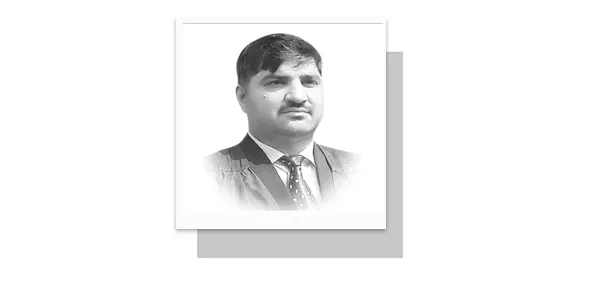SOMETIMES words fall short in the treasury of language when describing the sacrifices and contribution of certain individuals to their people, in addition to their professional responsibilities. Such is the case of former Corps Commander Lt. General Sardar Hasan Azhar Hayat, whose contribution to the people of Khyber-Pakhtunkhwa is immeasurable and has far-reaching effects on their lives. While I do not know him personally, his professional and personal services have been under constant observation since assuming command of the Peshawar Corps on August 8, 2022.
Gen Azhar Hayat inherited a complex security environment after the post unannounced withdrawal of US and its allies on August 30, 2021. This ended the two decades America’s forceful occupation of Afghanistan and left Afghanistan in rubles, people impecunious and homeless, and militant groups with unbridled freedom of engaging in criminal and terrorist activities by using modern sophisticated weapons inherited to them by allied forces. The militants and TTP now changed their strategy and started targeting security forces especially Police personnel as soft targets in parts of KP. Police in terms of resources, modern surveillance techniques, and weapons could hardly counter such waves of militants’ attacks. In addition, after 25th Amendment KP was expanded in terms of population and territory by merging the former Federally Administered Tribal Areas and Frontier Regions. The policing system in former tribal areas was extremely unsatisfactory because former Militia was used for policing instead of countering terrorism and militancy. The maintenance of law and order in these areas further became a challenge for KP Police.Thousands of police officers, Jawans and civilians embraced martyrdom. The Islamic Emirates in Afghanistan started facilitating TTP in its heinous terrorist activities against Pakistan rather to discourage TTP.
The militants destroyed schools, markets, hospitals etc in former FATA. Majority of children in these areas lost enrolment, especially girls. Condition of the roads was unsatisfactory. Local people lost their jobs and means of earning bread and butter for their families due to an anarchical situation therein. In such an odd prevailing security situation, the civil and military leadership were left with some harsh steps to counter militancy and also to rehabilitate the people of militancy-hit areas.
Former Corps Commander Peshawar Lt. Gen. Hassan Azhar Hayat initiated several significant measures, including: a) engaging in interactive sessions with students and youth across KP; b) organizing the first Women Symposium with over 350 participants; c) convening a Grand Jirga with tribal elders; d) hosting a Tribal Youth Jirga involving over 700 young individuals; e) conducting the inaugural National Security Workshop with 40 prominent participants; f) launching “Education for All” to enhance literacy rate in conflict-affected areas; g) overseeing peaceful general election in February 2024; h) bolstering the policing system with logistical support; i) introducing the Safe City project in Peshawar; j) practicing restraint during a critical incident on May 9th; k) renovating public parks and restaurants; l) refurbishing Peshawar Cantonment; m) restoring the historic Qissa Khawani Bazar; n) establishing Cadet Colleges in Merged Districts; o) promoting inclusivity by opening Corps Headquarters to all; and p) creating a Sports Complex at the University of Peshawar for the youth.
Gen. Hasan Azhar Hayat proved himself a dedicated soldier, frequently boosting the morale of his officers and Jawans through frontline visits. Shedding bureaucratic constraints, he displayed a democratic demeanour during interactions, prioritizing people’s needs over administrative formalities. His holistic approach tackled security threats while launching projects for social, educational and cultural rehabilitation where civil administration fell short. As a member of the Pakhtoon community, he empathized with KP’s people, addressing their grievances and instilling his policy among his staff. Despite resource limitations, his service resonated deeply with KP’s residents, earning him admiration as a true ‘Son of Soil’.
—The writer is Chairman, Department of Political Science, Islamia College Peshawar.
(amir@icp.edu.pk)










